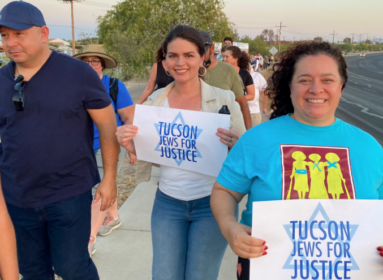
“Judaism doesn’t make the promise that everything is going to come out perfectly, but Judaism does command us to choose life … [and] life is staying in the game.”
By Cindy Mindell
A native of Southern California, rabbi, author, and spiritual life consultant Sherre Hirsch was ordained in 1998 and spent the next eight years as the first woman spiritual leader of Sinai Temple, Los Angeles’s largest and oldest Conservative synagogue.
Since then, Hirsch has written two books: We Plan, God Laughs: Ten Steps to Finding Your Divine Path When Life Is Not Turning out Like You Wanted (Harmony, 2008; published in 2009 as We Plan, God Laughs: What to Do When Life Hits You Over the Head) and Thresholds: How to Thrive through Life’s Transitions to Live Fearlessly and Regret-Free (Harmony, 2015). Her articles have appeared in many publications, including O Magazine, Time, Olam, and The Daily Beast. She counsels private clients, speaks nationwide at engagements for corporate and religious organizations, and teaches classes across a variety of themes. Hirsch serves as spiritual life consultant for Canyon Ranch Properties, where she organizes retreats and leads workshops focused on coping with grief and the healing process. Hirsch’s mission is to empower individuals to be their own spiritual guides. She lives in Los Angeles with her husband, Dr. Jeffrey Hirsch, and their four children.
Later this month, Hirsch will deliver the fifth annual Saul Cohen-Jewish Family Service Lecture in Stamford.
She spoke with the Ledger about the Jewish roots of her work helping people through difficult transitions, and discussed her upcoming presentations.
Q: What is the Jewish wisdom behind your writing, especially your latest book, Thresholds?
A: Jewish wisdom is good for all people because it’s a universal message that speaks to a wide audience. In my book, Thresholds, I talk about what it means to be in a hallway and what it means to be in a room. In life, we’re in a lot of rooms – places that are comfortable and that we understand, places where we know our sole purpose, and where we know how to behave, act, and think. But hallways are just places of transition to get from one room to another. And the truth is that we spend about a third of our time metaphorically in a hallway, and yet we have no skills or tools to ascend to the next room, and a false belief that we can go back.
Prozdor is the Hebrew word for hallway – a place that leads you from one place to another – and I think that we don’t spend enough time focusing on the hallways. When we start to look at them more closely, we’ll see that they have tremendous meaning and purpose; they give us a chance to pause, they give us a respite.
If you look at grief as a hallway, in Judaism, you step back: you observe shiva, shloshim, and have a year withdrawing from your normal life. That’s a hallway, and that hallway is meant to give you space; it’s meant for you to reconstruct your life in a new life, not to return to an old life. It’s meant for you to recognize that the next room may not be the best room of your life, but that it will lead you to another hallway and yet another room, and that, eventually, it will make sense. It’s to give you a chance to revisit faith – not specifically faith in God, but faith that regardless of how things turn out, I stay in the game. Optimism is the belief that everything will turn out great, and I don’t believe in that.
Judaism doesn’t make the promise that everything is going to come out perfectly and exactly like we want, but Judaism does command us to choose life, given the option between choosing death and choosing life, choosing life is staying in the game. Judaism doesn’t make false promises, which I think is a beautiful thing, because if it did, it would be hard to believe in, because every time those false promises didn’t work or something didn’t come out like you expected, it would lead you to reject your Judaism. It’s not a diet; it’s not like “If you eat these things, you will be 20 pounds thinner.” Many Jews believed for a long time and still do: “If I say a certain number of prayers, nothing bad will happen to me.” “If I am observant in this way, then I will be guarded.” Many Jews live with that sort of theology; I don’t believe that’s true.
Q: Why did you decide to leave the pulpit?
A: When I started working in a pulpit, I was 28 or 29 and I was single and I thought I would spend my life in the pulpit because I loved it – I loved being there for the most significant moments of people’s lives and everything in between.
When I left the pulpit eight years later, I was married, my father had died at age 58 from pancreatic cancer after six months, I had three children – one who had autism – and I subsequently found out that my mother had breast cancer. I would have another child and my mother would die of brain cancer – unrelated to the breast cancer – at age 65. My parents are only 18 years older than me.
What I say often is that life happens to you, around you, and in you, and you don’t know how it’s going to go. I realized at a certain point that I wanted to hold my mom’s hand at every chemo, and I wanted to be there for every IEP test for my son, and that I couldn’t have two families – because the family that I wanted to be solely there for would always be second.
So I made a very difficult decision – because it’s easy to make a decision when you’re unhappy; it’s not easy to make a decision when you’re happy.
People ask me if I look back and regret it; not at all. It was the next right room. I’m so grateful that, for the 18 months that my mother lived – when they told us that she would die in three days – that I got to hold her hand, I got to wash her face, and nothing kept me from it.
Q: One of your talks in Stamford is to social service professionals and educators on the topic of “Discovering the Cure to Compassion Fatigue.” What is ‘compassion fatigue?’
A: I’ve been looking a lot at compassion fatigue as it relates to the caretaker; why the caretaker is so sidelined in the face of the person who’s struggling. We sort of ignore that. We make an assumption that the caretaker is there because of their passion, because of their good will, because of their heart, but we don’t recognize that there is a statute of limitations to how much we can be that person, even if it’s our nature and even if it’s a job we’ve chosen.
But when we talk about self-care for the caretaker, we usually suggest surface actions like going to a nail salon or taking a hot bubble bath. The fatigue I feel when my mother is dying cannot be resolved by going to get a massage. It can make me feel better, it can make me feel calmer, but it doesn’t resolve my compassion fatigue – that I don’t want her to die and I’m exhausted taking care of her and I would prefer her living, and I would prefer coming over to tell her, “Can you pick up Eden at ballet?” So, this standard answer that we’ve come up with — that is, as self-care — I feel is wrong.
Part of what I like to look at is not to be disruptive for disruption’s sake, but to take Jewish wisdom and apply it to modern life because it’s far more powerful than the self-help model. Self-help is the belief is that I’m the guru and I have wisdom that you need to know. That’s not what I believe in. I’m the anti-guru: I believe the best wisdom is in you and my job is to empower you to discover it. That’s Judaism. It’s an unexpected message to hear to trust yourself, to know that you have great wisdom within you, that there’s great wisdom that’s 5,000 years old. I think people hunger to hear that. There’s nowhere in the world that tells them, “Trust yourself;” everybody’s trying to make a living by forcing other people to trust them.
Q: How does “compassion fatigue” relate specifically to your audience of Jewish communal professionals?
A: Part of what I’m going to talk about is what are our expectations when we go to work in the Jewish world and what is our obligation in changing how the Jewish world does business. I just said this at a meeting to someone: You want me to behave as a Jewish professional and act with all that spirituality and compassion but you want to behave like you’re in business and act with all this money and bottom line. I don’t want that: either we both act as Jews or we both act as businesspeople, but you can’t have me wanting to do one and you doing the other.
I get it: she wanted me to take all my kindness and love and all the things that make me a rabbi and say, “Oh, I don’t need money for that.” My answer to that is, I can’t go into Starbucks and say, “I’m a Jewish professional and I’m so devoted to bettering the Jewish community, so I’d like free coffee.” I wanted to draw her attention to the dissonance in these expectations.
The idea that you’re a Jewish professional is that you’re less than, but you’ve gone into the field because the kind of person you are is unique and empathic and compassionate and wants to leave the world a better place, but that kind of personality can be manipulated.
It’s a painful reality and we need a fundamental systemic change. I think that federations are struggling and becoming less and less compelling because they’re talking about engagement and longevity but they’re not talking about the fact that they’re fundamentally not prestigious. You have to make it prestigious. You have to make teaching prestigious, you have to make being a Jewish communal professional prestigious, and it should be worth one’s financial while. These professionals should be paid. It’s not just a matter of money, it’s a matter of value. Money is a piece of it, but what they find in all these Harvard Business School studies is that more than anything, people want to be valued and money is just a piece of value. Value is, I respect and see you and what you’re doing as meaningful and important and I treat you as such.
Saul Cohen-JFS Lecture featuring Rabbi Sherre Hirsch, “At a Crossroads: Navigating Expected and Unexpected Transitions,” Thursday, Nov. 17, 7:30 p.m., hosted by Jewish Family Service at the Ferguson Library, 1 Public Library Plaza, Stamford. Admissition is free and open to the community. For information: ctjfs.org, (203) 921-4161.
For Jewish 20s and 30s: “How to Live Authentically in the Digital World of Masks and Veils,” Nov. 16, 7:30 p.m. For information: (203) 921-4161.
For social-service professionals and educators: “Discovering the Cure to Compassion Fatigue” Thursday, Nov. 17, 1 p.m. For information: (203) 921-4161.







 Southern New England Jewish Ledger
Southern New England Jewish Ledger













